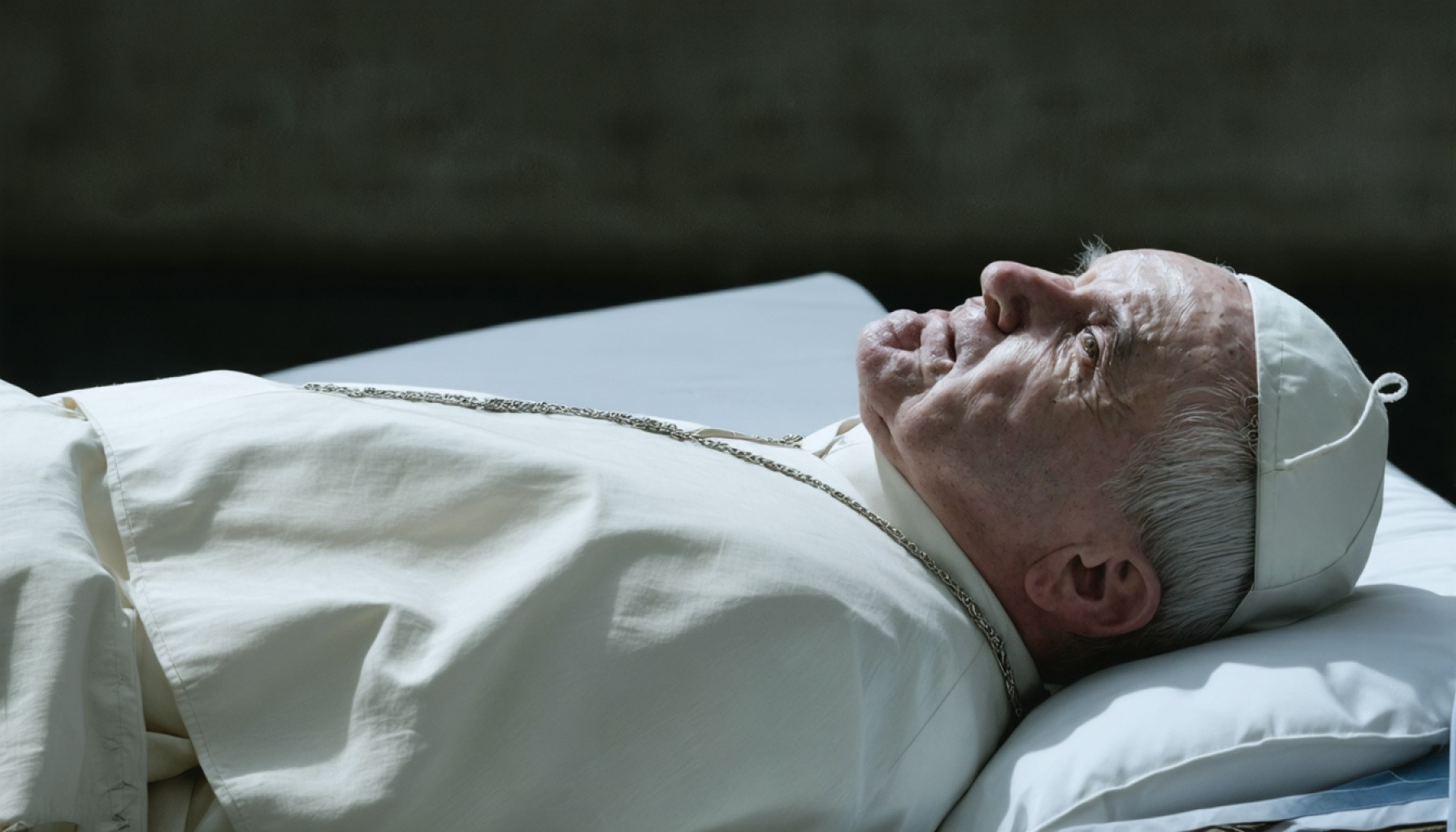- Pope Francis was hospitalized with bilateral pneumonia shortly after addressing the World Day of the Sick with a heartfelt message.
- The Pope’s reflections on illness as a path to encountering the divine mirror his current personal challenges.
- His experience transforms his philosophical musings on illness into personal inquiries, seeking strength in grace and divine fortitude.
- Illness is portrayed as a mystical opportunity, concealing a transformative solace and affirming the mystery of salvation.
- The Pope’s message emphasizes caretakers and companions as bearers of hope and messengers of divine love.
- He concludes with an ancient Marian prayer, urging people to unite in prayer: “Please, do not forget to pray for me.”
Amidst the echoes of ancient rituals and timeless wisdom, the Vatican’s corridors buzzed with an irony not lost on the faithful. Just days after his heartfelt message for the World Day of the Sick, Pope Francis found himself admitted to Rome’s Gemelli Hospital, grappling with the trials of bilateral pneumonia.
His earlier reflections, meant to console others, have now become his own balm. He had mused on the soul’s strength amidst debilitating illness, questioning how to remain robust when physical and emotional maladies persist. Yet, in a profound twist of fate, those questions now mirror his reality, transforming his reflections from philosophical musings into intimate inquiries. Here, the Pontiff, in the quiet battles of his hospital room, seeks solace not in isolation but in grace, providence, and divine fortitude—gifts of the Spirit that are woven into his own narrative of suffering.
The Pope’s eloquence portrays illness not as a mere trial, but as an opportunity to encounter the divine in profound ways. As candles flicker beneath the towering likeness of John Paul II at Gemelli, and murmurs of prayer for Francis rise like incense, the Pope affirms the mystery of salvation that health crises may conceal. Within the struggle, there exists a transformative solace—a mysterious overture to the divine promise that transcends earthly pain.
His words resound across the globe, reaching caretakers, family, and friends as “angels of hope.” These companions, bearing the weight of vigil, become messengers of divine love. Concluding with an ancient Marian prayer, he beckons all to entrust their pleas to a higher realm, while gently reminding us of the power of unity in prayer: “Please, do not forget to pray for me.”
How Pope Francis’ Recent Illness Sparks Global Reflections on Healing and Faith
How-To Steps & Life Hacks: Embracing Faith During Illness
1. Mindful Reflection: Start by integrating moments of quiet reflection into your day. Use this time for prayer or meditation to mentally prepare for challenges.
2. Community Support: Engage with spiritual or faith-based communities. Support groups can offer emotional comfort and practical help.
3. Spiritual Reading: Explore writings on spiritual resilience and healing, such as those by revered religious leaders, to gain new perspectives.
Real-World Use Cases: Spiritual Guidance in Healthcare Settings
In many healthcare facilities, chaplains or spiritual advisors are integrated into patient care teams. Their role is to support not only the physical but also the emotional and spiritual well-being of patients.
– Palliative Care Units: Patients often benefit from spiritual interventions that ease emotional distress.
– Patient Recovery Programs: Incorporating spiritual practices can enhance recovery by addressing both mental and emotional health.
Market Forecasts & Industry Trends: Spiritual Support in Modern Healthcare
The integration of spiritual care into healthcare is on the rise, with a 2018 survey from the HealthCare Chaplaincy Network indicating a growing demand for spiritual guidance in medical settings.
– Technological Shift: Apps like Calm and Headspace are increasingly popular, merging spirituality and mental health for comprehensive care.
– Increase in Holistic Care: Holistic and integrative models are expected to grow as patients and providers seek more well-rounded healthcare solutions.
Reviews & Comparisons: Spiritual Resources Literature
Books like “The Wounded Healer” by Henri Nouwen and “When Bad Things Happen to Good People” by Harold Kushner offer nuanced insights into dealing with suffering through faith.
Controversies & Limitations: Challenges of Spiritual Messaging
While spiritual care is beneficial, it may not resonate with everyone due to differences in personal beliefs. There is also a risk of spiritual messages being misinterpreted or underappreciated in secular contexts.
Features, Specs & Pricing: Popular Spiritual Apps
– Calm: A leading meditation app offering numerous guided meditations tailored for relaxation and healing. Annual subscription costs approximate $59.99.
– Headspace: Offers structured meditation courses, with an annual membership around $69.99.
Security & Sustainability: Data Privacy in Spiritual Apps
Ensure apps comply with data protection regulations, such as GDPR or CCPA, assuring user confidentiality and data security.
Insights & Predictions: The Future of Spiritual Health
Experts suggest that spiritual health will become a more integral part of patient care. Programs incorporating spiritual support stand poised for expansion in the next decade.
Tutorials & Compatibility: Using Spiritual Apps
Most of these apps are usable on both iOS and Android platforms. Set daily reminders to integrate short sessions into your routine seamlessly.
Pros & Cons Overview: Spiritual Practices in Healing
Pros:
– Encourages holistic healing.
– Offers emotional and mental support.
Cons:
– May not align with all belief systems.
– Could be interpreted as minimizing the severity of medical conditions.
Actionable Recommendations
For those inspired by Pope Francis and his messages during times of illness:
– Embrace Guided Meditations: Start with a free trial of an app like Calm or Headspace.
– Join a Support Group: Find a local or online community to share experiences and gain support.
– Read Spiritual Literature: Consider exploring books and writings on faith and healing for deeper insights.
For more on spiritual practices and holistic health, visit the World Health Organization website.
